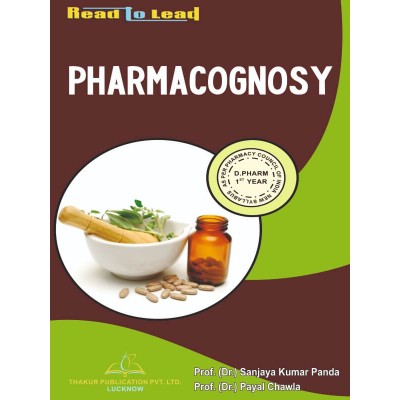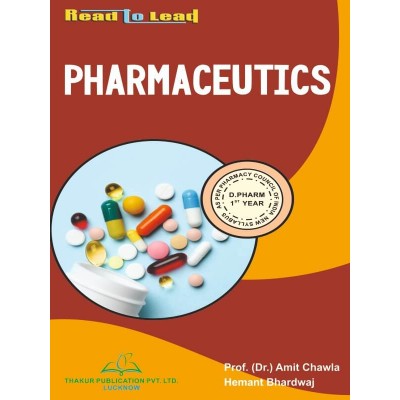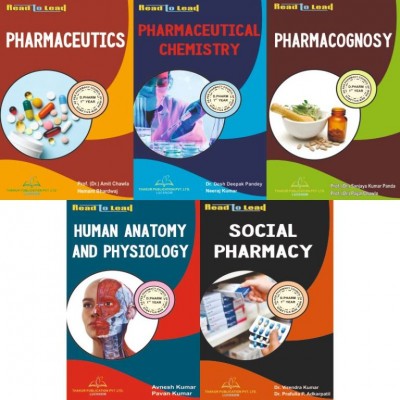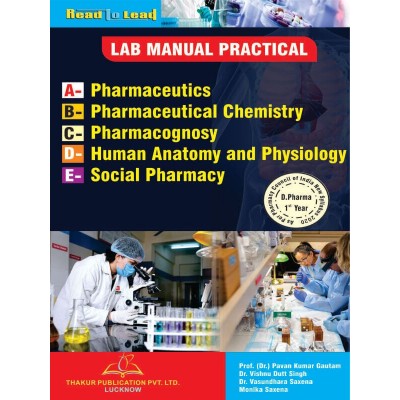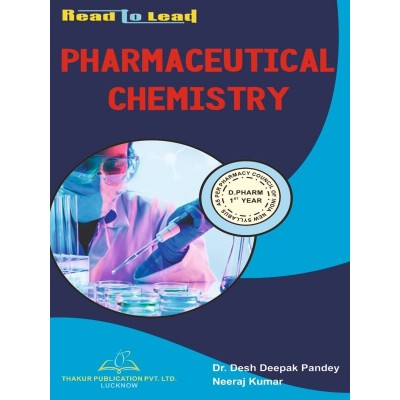Categories
- Pharmacy
- Nursing
-
MBA
-
BBA
- U.P. State University
- Veer Bahadur Singh Purvanchal University, Jaunpur
- Chaudhary Charan Singh University, Meerut
- Dr. Bhimrao Ambedkar University, Agra
- Chhatrapati Shahu Ji Maharaj University, Kanpur
- Mahatma Jyotiba Phule Rohilkhand University, Bareilly
- Mahatma Gandhi Kashi Vidyapith, Varanasi
- Dr. Ram Manohar Lohia Avadh University, Ayodhya
- Deen Dayal Upadhyaya Gorakhpur University
- Prof. Rajendra Singh (Rajju Bhaiya) University, Prayagraj
- BCA
-
B Ed
- Lucknow University B.Ed Books
- Chaudhary Charan Singh University/Maa Shakambhari University, Saharanpur
- Dr Bhim Rao Ambedkar University, Agra
- Mahatma Gandhi Kashi Vidyapeeth, Varanasi
- Chhatrapati Shahu Ji Maharaj University
- Prof. Rajendra Singh (Rajju Bhaiya) University, Prayagraj (PRSU)
- Mahatma Jyotiba Phule Rohilkhand University(Mjpru), Bareilly
- Dr. Ram Manohar Lohia Avadh University, Ayodhya
- Bundelkhand University, Jhansi
- Deen Dayal Upadhyaya Gorakhpur University
- Veer Bahadur Purvanchal University (VBPU)
- Maharaja Suhel Dev State University ,Azamgarh (MSDSU)
- Raja Mahendra Pratap Singh State University, Aligarh (RMPSSU)
- Barkatullah Vishwavidyalaya (Bhopal)
- Jiwaji University (Gwalior)
- Vikram University (Ujjain)
- Dr. Harisingh Gour University (Sagar)
- Devi Ahilya Vishwavidyalaya (Indore)
- Rani Durgavati Vishwavidyalaya (Jabalpur)
- Awadhesh Pratap Singh University (Rewa)
- Maharaja Chhatrasal Bundelkhand University (Chhatarpur)
- D. EL. ED
- TET
-
B Com
-
B Sc
- B.Sc. U.P. State Universities Common Syllabus NEP
- Veer Bahadur Singh Purvanchal University, Jaunpur
- University of Lucknow
- Chaudhary Charan Singh University, Meerut
- Madhya Pradesh
- Chhatrapati Shahu Ji Maharaj University, Kanpur
- Dr. Bhimrao Ambedkar University, Agra
- Mahatma Gandhi Kashi Vidyapith, Varanasi
- DEEN DAYAL UPADHYAYA GORAKHPUR UNIVERSITY
- Prof. Rajendra Singh (Rajju Bhaiya) University, Prayagraj
- Dr. Ram Manohar Lohia Avadh University, Ayodhya
- Mahatma Jyotiba Phule Rohilkhand University, Bareilly
- Uttarakhand State Universities
- B.Sc. Bihar Universities Common Syllabus NEP
- University of Rajasthan (Jaipur)
- Haryana
-
B A
- B.A. Of U.P. State Universities Common Syllabus NEP
- Veer Bahadur Singh Purvanchal University, Jaunpur
- University of Lucknow
- Chaudhary Charan Singh University, Meerut
- Chhatrapati Shahu Ji Maharaj University, Kanpur
- Dr. Bhimrao Ambedkar University, Agra
- Mahatma Gandhi Kashi Vidyapith, Varanasi
- Deen Dayal Upadhyaya Gorakhpur University
- Prof. Rajendra Singh (Rajju Bhaiya) University, Prayagraj
- Dr. Ram Manohar Lohia Avadh University, Ayodhya
- Mahatma Jyotiba Phule Rohilkhand University, Bareilly
- Madhya Pradesh
- Uttarakhand
- Bihar
- University of Rajasthan (Jaipur Syllabus as Per NEP2020)
- Haryana NEP-2020
- B Tech
Social Pharmacy D.Pharm 1st Year
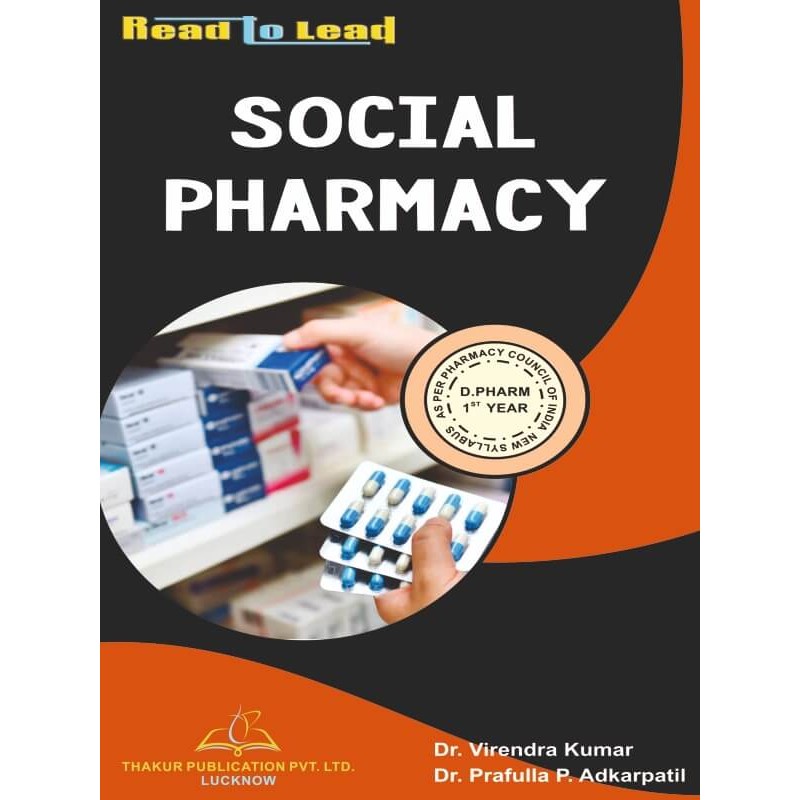
RS. 175.00 E-BOOK - GOOGLE PLAY
 Video Tutorial
Video Tutorial
The Social Pharmacy book is a comprehensive guide for first-year students pursuing a Diploma in Pharmacy (D.Pharm) as per the guidelines laid down by the Pharmacy Council of India (PCI). The book covers a wide range of topics related to the social, cultural, and economic aspects of healthcare, and the role of pharmacists in promoting the rational use of medicines.
FAST & ALL INDIA DELIVERY · USER-FRIENDLY LAYOUT · COVERED COMPLETE SYLLABUS
It also includes detailed information on the principles of healthcare ethics, pharmaceutical legislation, and pharmacovigilance. With clear and concise explanations and numerous illustrations, this book is an essential resource for students to gain a thorough understanding of the social dimensions of pharmacy practice and their relevance in the Indian healthcare system.
ISBN No.: 978-93-5480-061-0/Authors: Dr. Virendra Kumar, Dr. Prafulla P. Adkarpatil
₹290.00
Tax excluded
RS. 175.00 E-BOOK - GOOGLE PLAY
 Video Tutorial
Video Tutorial
The Social Pharmacy book is a comprehensive guide for first-year students pursuing a Diploma in Pharmacy (D.Pharm) as per the guidelines laid down by the Pharmacy Council of India (PCI). The book covers a wide range of topics related to the social, cultural, and economic aspects of healthcare, and the role of pharmacists in promoting the rational use of medicines.
FAST & ALL INDIA DELIVERY · USER-FRIENDLY LAYOUT · COVERED COMPLETE SYLLABUS
It also includes detailed information on the principles of healthcare ethics, pharmaceutical legislation, and pharmacovigilance. With clear and concise explanations and numerous illustrations, this book is an essential resource for students to gain a thorough understanding of the social dimensions of pharmacy practice and their relevance in the Indian healthcare system.
ISBN No.: 978-93-5480-061-0/Authors: Dr. Virendra Kumar, Dr. Prafulla P. Adkarpatil
Syllabus
Course Code: ER20-15T
SOCIAL PHARMACY
|
Chapter |
Topics |
Hrs. |
|
1 |
Introduction to Social Pharmacy · Definition and Scope. Social Pharmacy as a discipline and its scope in improving the public health. Role of Pharmacists in Public Health. (2) · Concept of Health - WHO Definition, various dimensions, determinants, and health indicators. (3) · National Health Policy - Indian perspective (1) · Introduction to Millennium Development Goals, Sustainable Development Goals, FIP Development Goals (1) |
7 |
|
2 |
Preventive Healthcare - Role of Pharmacists in the following: · Demography and Family Planning (3) · Mother and child health, importance of breastfeeding, ill effects of infant milk substitutes and bottle feeding (2) · Overview of Vaccines, types of immunity and immunization (5) · Effect of Environment on Health - Water pollution, importance of safe drinking water, waterborne diseases, air pollution, noise pollution, sewage and solid waste disposal, occupational illnesses, Environmental pollution due to pharmaceuticals (6) · Psychosocial Pharmacy: Drugs of misuse and abuse -psychotropics, narcotics, alcohol, tobacco products. Social Impact of these habits on social health and productivity and suicidal behaviours (2) |
18 |
|
3 |
Nutrition and Health · Basics of nutrition-Macronutrients and Micronutrients (2) · Importance of water and fibres in diet (1) · Balanced diet, nutrition deficiency diseases, ill effects of junk foods, calorific and nutritive values of various foods, fortification of food (3) · Introduction to food safety, adulteration of foods, effects of artificial ripening, use of pesticides, genetically modified foods (1) · Dietary supplements, nutraceuticals, food supplements - indications, benefits, Drug-Food Interactions (2) |
7 |
|
4 |
Introduction to Microbiology and common microorganisms (3)
Epidemiology: Introduction to the terms Epidemiology, its applications, terms such as epidemic, pandemic, endemic, mode of transmission, quarantine, isolation, incubation period, contact tracing. (2)
Causative agents, epidemiology and clinical presentations and Role of Pharmacists in educating the public in prevention of the following Communicable Diseases: · Respiratory infections - chickenpox, measles, rubella, mumps, influenza (including Avian-Flu, H1N1, SARS, MERS, COVID-19), diphtheria, whooping cough, meningococcal meningitis, acute respiratory infections, tuberculosis, Ebola (10) · Intestinal infections - poliomyelitis, viral hepatitis, cholera, acute diarrheal diseases, typhoid, amebiasis, worm infestations, food poisoning (8) · Arthropod-borne infections - dengue, malaria, filariasis and, chikungunya (4) · Surface infections - trachoma, tetanus, leprosy (3) · STDs, HIV/AIDS (3) |
33 |
|
5
|
Introduction to health systems and all ongoing National Health Programs in India, their objectives, functioning, outcome and the role of pharmacists. |
5 |
|
6 |
Role of Pharmacists in Disaster Management. |
2 |
|
7 |
Pharmacoeconomics - basics, Health Insurance, Health Maintenance Organizations (HMOs), Health spending, Out-of-pocket expenses |
3 |
PCI2021/D.Pharma(English)/1/05
44 Items
New product


